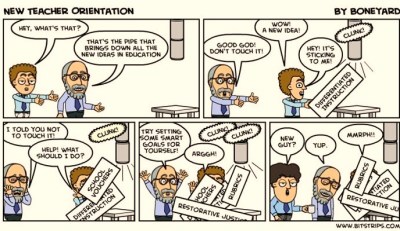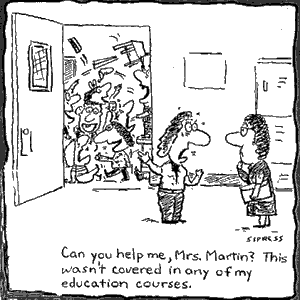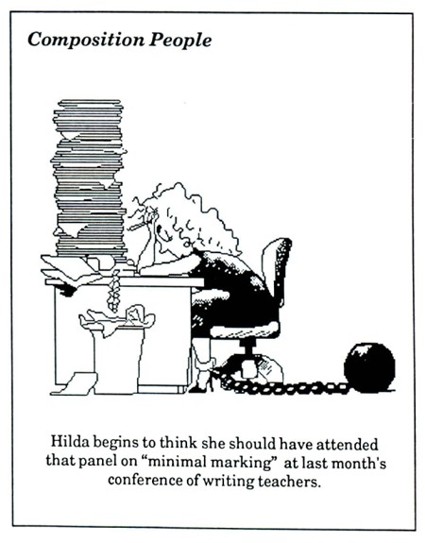In the past fortnight, I’ve been thinking deeply about what it must be like for student teachers who are working hard to become a qualified teacher. Much has been made of the importance of QTS – for excellent articles on the subject, read Alex Quigley’s article for the Guardian and Tom Bennett’s piece for the TES.
However, I’ve been more interested in the fledgling beliefs of our student teachers about what makes a great teacher. It’s easy to forget about how bloody difficult it is being a student teacher: you’re learning new ideas at a rapid pace; you’re trying out these ideas on students you don’t really know; you have no point of comparison to judge whether you’re making progress with these students or not; you’re ridiculously tired; you don’t have your own classes so you’re constantly being judged by the students in relation to their normal teacher. This week, I flippantly remarked to a group of student teachers how lovely it would be to only teach nine hours a week. They laughed politely but, as soon as I said it, I thought to myself ‘What a stupid thing to say!!! How long are these student teachers spending on these nine lessons?’ I was cross with myself for falling into the trap of an experienced teacher lording it over new members of staff and telling them how terribly difficult it is teaching a full timetable.
On Friday, I was reminded of this exchange when I saw a tweet from Rachael Stevens, aka @murphiegirl, discussing the experience of her student teachers. She said that her student teachers were spending five hours planning and resourcing for a lesson that lasts for just one hour!
This rings true from what our student teachers were saying to me on Wednesday during our training. One student teacher told me they’d spent an hour planning a 10 minute starter. I was exactly the same when I was in her position; I would spend hours planning lessons and I couldn’t imagine how I would survive teaching 20 hours a week. Luckily, my mentor told me that it was totally unrealistic to plan in that much detail and gave me a really good weekly structure to follow. We taught three hours of English a week and she said to do a really well-planned first lesson, lots of teacher explanation and modelling combined with resources to support students. The second lesson should be about scaffolding to see if the students learnt what they were intended to in the previous lesson. This time, the resources needed to be focused on providing different exemplars to allow students to compare their work with different levelled/graded pieces. The final lesson of the week would be very little teacher input, a co-constructed success criteria before students practised independently what it was I had tried to teach them in the first lesson.
This approach was revelatory! Suddenly, my planning was cut in half and I started to gain a much clearer picture of my students’ progress each week. Over the years, I have tweaked this approach as I have increased my pedagogical knowledge but the structure remains pretty much the same, albeit over a longer period of time than a week (I could only think week by week back then!).
So back to this week’s training with the student teachers. I have delivered many sessions over the years and have mentored student teachers on various routes as well as NQTs – I’ve got resources coming out of my ears. But here’s the thing: I don’t know if I’m still the same teacher I was a year ago. I don’t know if everything I’ve said in the past is what I still think now. Completing my MA in Education and having access to excellent books and journals, combined with joining Twitter and reading many fantastic blogs has made me question previously held views. This week I wanted to take a different approach to the training and focus on the student teachers understanding the difference between filling time and planning for learning.
It was an interesting session and afterwards the student teachers said they’d got a lot out of it. They could obviously be trying to be nice but the questions they were asking and their responses to mine led me to believe that they were thinking hard about what really matters. What follows is a summary of the session and the main ideas that student teachers were concerned about in their first term of teaching.
Activities, activities, activities: how to fill up time
Student teachers seem to be under the assumption that a great lesson is about planning lots of fun activities. They are spending an enormous amount of time on planning activities which require time-intensive resourcing. Unfortunately this has led to nothing more successful than an addiction to laminating and guillotining. How much it has led to an increase in student progress is questionable. Experienced teachers know they need to think about what they want students to learn first and then think about what activity will be useful for the lesson. When you start out, it is much more difficult to identify what you want students to learn over a sequence of lessons. We spent time in the session thinking about how these time-intensive activities could be tweaked to ensure that they did not require such a vast input of resources. By the end of this part of the session, the student teachers had come up with a bank of hooks they could start each lesson that required little resourcing and could be reused with minimal changes each week. They also decided on a bank of ‘takeaways’ as we call it, to judge whether students have understood the most essential new piece of knowledge from that lesson. The key is to use these hooks and takeaways in a cycle so students focus less on the activity because they are so familiar with it and more on the thinking they will need to evidence their learning. At our school, we have our version of the 5 minute lesson plan that staff can use to plan their lessons quickly yet effectively. We also like to share David Didau’s post ‘Go with the flow: 2 minute lesson plan’.
Group work: students must learn from each other
When I asked student teachers how they felt about group work, they all said how important it was and that they tried to include it in every lesson. All of these student teachers are from the same university and had read some literature on the importance of ‘doing group work’. Now, I want to make my position clear: I am not anti-group work. I am anti time wasting, making students do tasks that they could have done better by themselves and thinking group work is anything involving students sitting around the same table. I am for tasks that focus on cognitive development and social development second. When I asked the students if they had encountered any problems doing group work, their responses were not surprising – I’m not going to bother listing all of them here but they expressed concerns about getting everyone to pull their weight and how to manage behaviour. More importantly, when I introduced Martin Robinson’s, aka @SurrealAnarchy, article about group work they were stunned. They were under the impression that they needed to set up group work in every lesson. There was excellent discussion around the need to train students to work effectively in groups and perhaps not to even attempt it until they had mastered pair work, as suggested by Martin in his article.
AfL: time to get out those lollypop sticks
Interestingly, the first and only research they’d come across on their course was Black and Wiliam’s Inside The Black Box. They knew how important AfL was because they needed to make reference to it in their evaluations and they had all tried out self and peer assessment activities. Some of them had tried lolly pop sticks to develop their questioning strategies; others had tried getting the students to write a WWW / EBI on their partner’s work. Both of these strategies had been suggested by their university tutors. I gave them a copy of a grid Mel and I made where we look at the differences between superficial and sophisticated AfL. Much of our recent discussion on sophisticated AfL stems from reading Claire Gadsby’s Perfect Assessment for Learning. We often feel saddened that AfL has been devalued and cheapened by boiling it down to a few tricks and tips to use that can be ticked off on an observation or evaluation form. AfL is an ethos, a spirit of continual improvement. It is about building up a culture of feedback over a sustained period of time. This cannot be achieved by gimmicks alone. For an insightful post on AfL, look no further than Joe Kirby’s take on the problems with AfL. We advise all student teachers to read this during their teaching practice.
Marking: how do you mark all of these books?
The student teachers have just started marking a few books with their subject mentors to get a feel for marking and feedback. They are at a loss as to how they will be able to mark nearly 200 students’ books. I told them that it was perfectly natural to feel like that – we all felt like that sometimes, regardless of how long we’d been teaching! We talked about the importance of creating a marking schedule. This is one of the first things I do with my student teachers. We start with the assessment and work backwards.
How will the students be assessed?
What do they need to know and be able to do?
How many lessons will you need to teach what is to be assessed?
At what points in the topic will you test what the students have learnt so far and give them feedback?
From these questions, we plan mini assessment points which will require feedback before the summative assessment at the end of the topic. We try and balance the demands of KS3 and KS4 so that there are not too many long pieces of work to mark in both key stages with similar deadlines. If student teachers can create a workable marking feedback rota, this helps them balance their workload and they are less likely to drown around March time when they’re teaching 12 lessons, are really tired, getting ill and trying to secure a job for September.
We recommend our student teachers read Alex Quigley’s post on marking and feedback, which is realistic yet rigorous. If they can give feedback like Alex, then they’re onto a winner!
Lessons to be learnt
I don’t think I have ever questioned my approach to teaching as much as I have this year. I tried to relate this to the student teachers. You never feel 100% confident that what you’re doing is the ‘right way’. You’ll read something new and you’ll try something out and realise it is better than what you were doing previously. You never stop learning. Being a brilliant teacher means you will never feel comfortable. As soon as you do, it’s time to up your game once more. There is much to be learnt from student teachers: their minds are open to learning new ideas and they want to be the best teachers that they can. Good luck to all those who have started their journey to being a qualified teacher – it really is the best job in the world!




Reblogged this on The Echo Chamber.
When planning lessons always write “pupils will……” and don’t write “I will…..”
You will avoid the common pitfall of pupils going off task. For example don’t write “I will explain…..” or “I show video”. Turn it into “pupils listen and write…..”.
Also evaluate your lesson properly after delivery!! Try my #5mineval at sleramblings.wordpress.com/5mineval
Fantastic post which captures a lot about the way I have been feeling recently. And has given me some good links for further reading! Thanks.